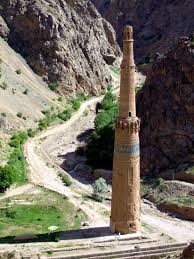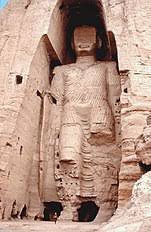The 'Emergence', 'Downfall', and 'Resurgence' of the Taliban Regime in Afghanistan
- Apr 4, 2024
- 3 min read
Once perceived as "The Heart of Asia", the country has now become a perpetual battlefield. A land where the euphonic sound of rubab accompanied the dawn, now wakes up to the pesky sound of bombings and firings. As much as the world is aware of its ultraconservative and extremist regime that prevails to date, the world has somewhat forgotten its affiliation with the "Indus-Valley Civilization", "Mauryan Empire", "Buddhism" and several other renowned empires that made a significant and impactful contribution to the cultural development of Afghanistan. Who would have thought that the center of Persian art and learning, which flourished during the reign of Mughal Emperors would live to witness the destruction of its magnificent landscape and UNESCO-recognized world heritage sites ("Minaret of Jam" and "Buddhas of Bamiyan")?
The land-locked country of Afghanistan accounts for a long history of instability and hostilities, due to foreign interventions, internal rivalries, and the absence of a strong stable government. The emergence of the Taliban, an extremist Islamist group, can be traced back to the early 1990s, following the withdrawal of Soviet troops from Afghanistan. The Taliban was majorly composed of students from the Islamic seminaries (madrasa) of northern Pakistan. It primarily aimed to restore order by implementing a strict interpretation of Sharia law which they considered as ravaged by the earlier regimes. With constant backing from Pakistan and financial support from the Gulf Arab States, the Taliban successfully gained momentum. The government of President Burhanuddin Rabbani was overthrown in 1996 from Kabul, paving the way for the establishment of the Islamic Emirate of Afghanistan under the stewardship of Mullah Mohammed Omer. They capitalized on the rapidly increasing discontent of the population with the existing warlord faction and promised stability to the citizens. However, it wasn't long before the citizens became aware of their real agenda. Music, television, dance, or any form of entertainment was strictly forbidden, implementation of harsh punishments could be seen largely impacting minorities and women, and adding to the exhausting list of restrictions imposed on women, they were also instructed to follow a strict dress code.
After some decades of exploiting the population of Afghanistan, the Taliban encountered international condemnation and abandonment due to their intimate ties with the mastermind of the 9/11 attack, Osama Bin Ladden, and his Al-Qaeda networks. Taliban's sheltering policy extended towards al-Qaeda laid the foundation of their downfall. The US-led military coalition, post-2001 incident, launched an aggressive military campaign to scrape off al-Qaeda, which resulted in the ousting of the Taliban. Despite the overthrowing of the Taliban, there was a series of wars between the forces of NATO and the Taliban which caused thousands of casualties. The US struggled to build a relatively stable period with a transitional government and it could not entirely do away with the Taliban regime.

Eventually, the Taliban planned an insurgency and started regaining their ground with much destructive nature, over the years. In February 2020, after almost 14 years of converting Afghanistan's lush valleys into a war zone, the US and Taliban signed a peace agreement in which the US consented to withdraw all the troops from Afghanistan on the condition that the Taliban would participate in peace negotiations with the government and would refrain from perpetuating any affiliations with the al-Qaeda. In April 2021, NATO also decided to pull back its troops from Afghanistan. By mid-August 2021, the Taliban had covered most of Afghanistan, including its capital Kabul, under their ambit.
Even though the Taliban has claimed to be progressed and less exploitative, a major part of the world, even today attributes cases of terrorism, abuse of human rights, suppression of freedom of speech, formation of extremist propaganda, detention of journalists, violation of international peace policies, and a well-documented exploitation of women, unfolding in Afghanistan, to the Taliban regime.








Comments